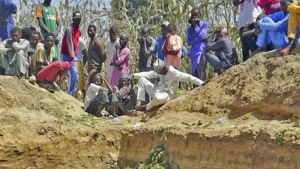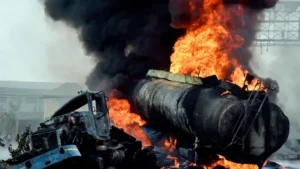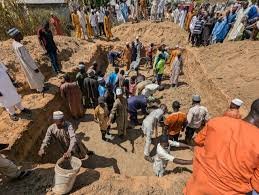One week after the petrol tanker disaster that killed about 200 residents, echoes of grief envelop the atmosphere of Majiya town of Taura Local Government Area of Jigawa State. Survivors and grieving families spoke to our correspondent, Hussaini Ibrahim Sulaiman who was in Jigawa.
Grieving Families
Residents include the grieving members of families of those who lost their lives on Tuesday’s inferno in Majiya town of Taura Local Government Area of Jigawa State have blamed the Federal Government for the calamity that claimed multiple lives and caused extensive damage.
Survivors and local stakeholders have attributed the incident to the federal government’s “cruel policies,” citing soaring fuel prices, economic downturn, and a rising of commodes as contributing factors.

It would be recalled that, a devastating petrol tanker explosion occurred late Tuesday night and continued until the early hours of Wednesday, claiming the lives of over 178 people and left 70 others injured in Majiya town of Taura Local Government Area of the state.
Health Workers
Health workers and rescue personnel said the casualty figure could rise, considering that some of the victims sustained third-level burns with their vital organs affected. Our correspondent who was at the town on Saturday gathered that about four corpses of died bodies were bring to the town from various hospitals.
An Eyewitness
An eyewitness told our correspondent that, when the tanker overturned around 11:00 pm local residents from the community and neighbouring trooped to the scene to scoop the fuel. About an hour later, the truck exploded engulfing nearby vehicles and pedestrians in flames.
A father, MALAM HAMZA IBRAHIM, who lost four children, one brother and four nephew recounted his grieving experience of the incident: “I was at home around 11::30 pm when the incident happened. I overheard people wailing, seeking for help. I abruptly went out thinking it was an accident. A teenager told me it was a petrol tanker. I didn’t go to the scene until I suddenly saw a spark if fire. I was not aware my children were there. I quickly began searching for them, asking people where’s Malami, Mustaph, Yusuf and Abba.
Phones Switched
“I also called their phones, but all were switched off. Only Abba’s phone was on. His colleague answered and informed me his phones were at the hospital, but they were also looking for him.

ABBA HAMZA, the elder son of Malam Hamza Ibrahim, was a nurse at Khadija Clinic and Maternity in town. He died during the rescue, when he rushed to the aid of the victims.
After searching through the scene, he assumed his children were among the affected people and returned home to inform his wives, who burst into crying. He said he urged them to recite Inna nillahi wa’inna ilaihi raji’un.
Malam Ibrahim attributed the incident to the economic hardship and soaring commodities, noting that the youth of Majiya town were known for their honesty and had never taken anything from others, even when there were opportunities to do so.
A Survivor
A survivor, HARUNA GARBA ABUBAKAR, a father of seven who sustained injuries in parts of his body said he was sleeping when his wife woke him up to inform him that his children had gone to the scene of the petrol tanker accident. According to him, he immediately took his tricycle to the incident to bring them home.
Upon arrival, he was told that his children were at a bridge near the tanker. He spotted one of them and instructed him to tell his brothers to leave the area. Shortly afterward, the fire started and that’s how he sustained injuries.
He criticized the lack of official government assistance and stated that he had paid for his own medical treatment, though his name was recorded, he received no aid.
19-year-old boy whose face damaged by the explosion echoed his story:
AUWALU DAHURU who survived the devastating tanker explosion recounted that he sustained severe injuries his back, legs and face, described the incident as a near-death-experience.
He said he was fetching the petrol with seven friends inside a drainage when the fire erupted. “I thought it was a day of judgement,” he recalled.
Dahuru said there were over 50 people near him when the fire started, and nearly all of them were affected. Tragically, two people lost their lives. And 10 families were also devastated by the disaster, himself and other one person were the only survivors.
The Africa Health Report learnt that despite efforts by the state government to evacuate the victims to various Federal Hospitals in Dutse, Kano and Yobe, many victims remained reluctant to seek medical attention. These individuals preferred to rely on traditional medicine instead of conventional treatment.
Some victims resist modern medicine
BABANGIDA MUNTARI, AUWAL DAHURU, AND HARUNA GARBA ABDULLAHI, three of the survivors, expressed their preference for traditional medicine in separate speeches. They cited the overcrowding at the local primary healthcare center on the day of the incident as one of the reasons for their decision. The victims claimed that they were making progress with traditional remedies and felt more comfortable with them.
However, a healthcare professional, Dr. YAHAYA HAMZA MAJIYA, medical doctor at Khadija Clinic and Maternity warned against the use of unapproved traditional medicines. He emphasized that these remedies did not undergo proper testing and could potentially pose health risks, such as skin cancer.
The incident has highlighted the ongoing challenges faced by many Nigerians in accessing quality healthcare, particularly in rural areas. While modern medicine offers significant advancements, traditional healing practices continue to play a vital role in many communities. The government and healthcare providers will need to address these issues to ensure that all citizens have access to appropriate and effective medical care.
It’s important to note that some victims who initially resisted conventional medicine eventually brought their loved ones to the hospital for treatment. This suggests that the decision to use traditional medicine may be influenced by various factors, including cultural beliefs, personal experiences, and access to healthcare facilities.
Role of local government council
ALJAWAD ABDULSALAM MAJIYA, the councilor for Majiya ward in Taura Local Government, has reported a toll from the recent figure. According to Majiya, 172 people lost their lives in the incident, while over 86 others sustained injuries.
The councilor described the immediate aftermath of the explosion, explaining that the first response was to call ambulances to transport the injured to nearby hospitals. He also mentioned that the community has been receiving donations from across the country and that the governor has established a committee to oversee the distribution of relief aid.
Majiya urged those who had hesitated to seek medical attention for their families to reconsider. He revealed that some victims were brought to the hospital on Friday and encouraged others to follow suit.
According to him. himself and a special assistant to the state governor actively visited various towns in the area, urging people to bring their affected family members for medical treatment.
Religious perspective on the event
The Chief Imam of the town affected by the recent tanker explosion, MALAM ISA,has expressed anger over the looting that occurred following the tragedy. While acknowledging that the youth of the town are generally known for their honesty, Isa attributed the looting to the current economic hardship and the desperation it has created.
The Chief Imam emphasized that Islam forbids taking things that do not belong to you. However, he believes that the difficult circumstances have driven some individuals to engage in such acts.
Despite the outpouring of donations from across the country, Isa stated that the affected community has yet to receive any tangible assistance. This has led to further frustration and anger among the survivors.



